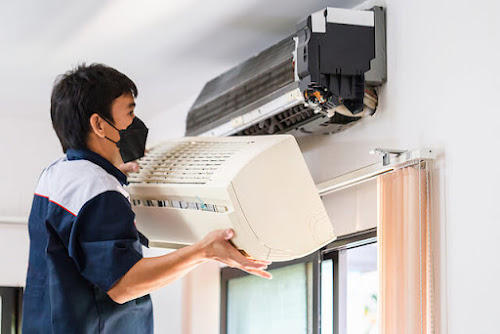The Link Between Indoor Air Quality and Your Air Conditioner
In today's fast-paced world, our lives are intricately linked with technology and modern comforts. One such comfort is air conditioning, which has revolutionized the way we experience indoor environments. But have you ever considered the connection between your air conditioner and the quality of air you breathe? In this article, air conditioning service Melbourne will delve into the vital link between indoor air quality (IAQ) and your air conditioner, exploring how these systems can impact your health and well-being.
Introduction
As we strive for comfort within our indoor spaces, we often overlook the invisible factor that significantly influences our health and comfort: indoor air quality (IAQ). The air we breathe indoors can have a profound impact on our well-being, and one of the key players in maintaining good IAQ is our trusty air conditioner.
Understanding Indoor Air Quality (IAQ)
Indoor air quality refers to the condition of the air within and around buildings, especially as it relates to the health and comfort of the occupants. Poor IAQ can lead to various health issues, ranging from minor discomfort to severe respiratory problems.
The Role of Air Conditioners
Air conditioners do much more than just cool the air. They play a crucial role in regulating temperature, controlling humidity levels, and enhancing overall comfort. However, their contribution to indoor air quality often goes unnoticed.
Factors Affecting IAQ
4.1 Importance of Ventilation
Proper ventilation is a cornerstone of good IAQ. It ensures a constant exchange of indoor and outdoor air, preventing the buildup of pollutants.
4.2 Filtration Systems Matter
Airborne particles like dust, pollen, and pet dander can significantly degrade IAQ. Effective filtration systems in air conditioners can trap these particles and prevent them from circulating in the air.
4.3 Impact of Humidity Control
Excess humidity can lead to mold growth and dust mites. Air conditioners help maintain optimal humidity levels, mitigating these issues.
4.4 Addressing Chemical Pollutants
Airborne chemicals from cleaning products and furnishings contribute to IAQ degradation. Air conditioners equipped with air purifiers can remove or reduce these pollutants.
How Air Conditioners Influence IAQ
5.1 Air Circulation and Ventilation
Air conditioners facilitate air circulation, reducing the concentration of indoor air pollutants. Proper ventilation ensures a steady flow of fresh air.
5.2 Airborne Particle Filtration
Filters in air conditioning systems capture particles that can trigger allergies and respiratory problems, thus enhancing IAQ.
5.3 Regulating Indoor Humidity
By controlling humidity, air conditioners prevent mold growth and make the indoor environment less hospitable for dust mites.
5.4 Minimizing Mold Growth
Air conditioners can inhibit mold proliferation by creating an environment that discourages its growth, safeguarding both IAQ and structural integrity.
Signs of Poor IAQ
6.1 Health Discomfort
Unexplained health issues like headaches, fatigue, and dizziness can arise from poor IAQ.
6.2 Lingering Odors
Persistent unpleasant odors may indicate the presence of pollutants or mold.
6.3 Visible Mold Growth
The appearance of mold on surfaces is a clear sign of elevated humidity and poor IAQ.
6.4 Increased Allergies and Respiratory Issues
Worsening allergies or frequent respiratory problems could be linked to inadequate IAQ.
Improving IAQ Through Maintenance
7.1 Regular Air Filter Replacement
Frequent replacement of air filters optimizes their particle-trapping efficiency.
7.2 Professional HVAC Maintenance
Regular professional maintenance ensures that your air conditioning system functions effectively in enhancing IAQ.
7.3 Air Duct Cleaning
Clean air ducts prevent the circulation of dust and pollutants throughout the indoor space.
7.4 Monitoring Humidity Levels
Regularly checking and controlling indoor humidity levels curbs mold growth and allergen proliferation.
The Future of Air Conditioning and IAQ
Advancements in technology are paving the way for smarter, more efficient air conditioning systems that prioritize both comfort and IAQ.
Conclusion
The link between indoor air quality and your air conditioner is undeniable. A well-maintained air conditioning system can significantly enhance IAQ, leading to a healthier and more comfortable indoor environment for you and your loved ones.
FAQs
- Can air conditioners completely eliminate indoor air pollutants? While air conditioners with advanced filtration systems can significantly reduce indoor air pollutants, complete elimination may require additional air purification systems.
- How often should I replace my air filters? It's recommended to replace disposable air filters every 1 to 3 months, but it can vary based on usage and filter type.
- Can mold grow inside the air conditioner? Yes, if not properly maintained, air conditioners can develop mold, which can then be circulated into the indoor air.
- What is a good humidity level for indoor spaces? Ideally, indoor humidity should be kept between 30% and 50% to prevent mold growth and maintain comfort.
- Is IAQ more important for certain individuals? Yes, individuals with allergies, respiratory conditions, or weakened immune systems can be more sensitive to poor IAQ, making it crucial for them.

Comments
Post a Comment